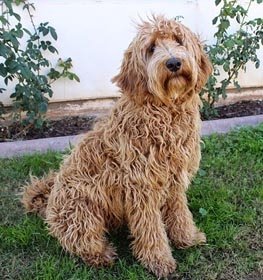Lab Pointer Information & Dog Breed Facts
Collection of all the general dog breed info about Lab Pointer so you can get to know the breed more.
| Group | Designer Dogs |
|---|---|
| Popularity Rank | 614 |
| Reviews | 1 |
| User Ratings | |
|
Compare the Lab Pointer With Other Dogs
Select at least one dog breed to make the comparsion. | |
 | |
| Origin | |
|
Common Names & Aliases
What other names is a Lab Pointer known by? Discover all traditional, regional and informal names used for this breed. | Pointerdors |
|---|---|
|
Breed Classification
What type of dog breed is a Lab Pointer? Learn about its genetic classification and breeding category. | Cross Breed |
|
Size Classification
What size category is a Lab Pointer? Learn how big the Lab Pointer breed typically grows. | LargeMedium |
|---|---|
|
Weight Statistics
How much does a Lab Pointer weigh? Discover typical weight ranges for adult males and females of the Lab Pointer breed. | 35-80 pounds (16-36 kg) |
|
Average Weight
What is the average weight of a Lab Pointer? | 57.5 pounds (26 kg) |
|
Height
How tall is the Lab Pointer? Lab Pointer height: | 22-28 inches (55-71 cm) |
|
Average Height
What is the average height of a Lab Pointer? | 25 inches (63 cm) |
|
Price Range
How much does a Lab Pointer puppy cost? Find current market prices and factors affecting Lab Pointer costs. | $200-$600 If you choose to purchase the Lab Pointer, you should know that the mentioned amount of money is an average of the collected data from breeders’ sites and puppy finder places. If you have a Lab Pointer for sale, please advertise it on a reliable website to make sure the Lab Pointer gets to a happy place. |
|---|---|
|
Availability
How easy is it to get a Lab Pointer? How many Lab Pointer are there in the world? | Average: The Lab Pointer is a commonly available dog breed. There is less risk of overbreeding compared to the very popular dogs. Of course, they may be more popular in some countries, and inbreeding may occur, so be careful. |
|
Intelligence Rating
How intelligent is a Lab Pointer? Discover the Lab Pointer's intelligence ranking and learning capabilities. | Smart: The Lab Pointer dogs have great intelligence. They understand and memorize new commands in 15-25 repetitions.
The Lab Pointer is among the smartest dogs in the intelligence ranking. |
|---|---|
|
Training Difficulty
How easy is it to train a Lab Pointer? Learn about the Lab Pointer's trainability and response to training methods. | Lab Pointer dogs are easy to train. They find out the association between commands and actions quite quickly. |
|
Watchdog Rating
How good is a Lab Pointer as a watchdog? Learn about the Lab Pointer's alertness and guarding instincts. | Lab Pointer dogs are average watchdogs. If they sense something different, they will alert you, but observation isn't considered their main job.
|
|
Territorial Protection
Is a Lab Pointer protective of its territory? Learn about the Lab Pointer's guarding instincts and behavior. | Lab Pointer dogs are average defenders. Some dogs are very protective of their territory, while others easily let a stranger to trespass. This breed is not sure to defend its territory in every situation. |
|
Personality Traits
What personality does a Lab Pointer have? Learn about characteristic Lab Pointer temperament and behavior traits. | ActiveEnergeticIntelligentLoyalGentle |
|---|---|
|
Sensitivity Level
How sensitive are they? Lab Pointer sensitivity: | Lab Pointer dogs have an average emotional level and are not the most sensitive dog breed. Sometimes it's okay to change the daily routine, have guests and listen to loud music.
Some dogs handle moderate punishment very well, while others crumble apart at a dirty look. This breed is not affected emotionally by moderate punishment. |
|
Affection Level
How affectionate are they? Is a Lab Pointer a good family dog? | High: Lab Pointer dogs are genuinely loyal, soft and gentle, loving, and affectionate dogs toward their handlers. They enjoy quality time with their owners despite the activity and are considered great therapy dogs for those in need. This breed responds strongly to their handler's emotions because they bond closely. Their happiness is your happiness. |
|
Social Needs
How much social interaction does the Pointerdors need? Lab Pointer social needs: | Lab Pointer dogs need a lot of social interaction. They desire to always be with someone or around people. This breed hates being left alone. |
|
Impulse to Wander or Roam
How likely is the Lab Pointer to run away? Does this breed explore or wander a lot? Does Lab Pointer roam? | The wanderlust potential of the Lab Pointer is strong enough to escape from home. They have a strong desire for exploring the world. Safer to walk them on a leash unless you teach them how to get back to you on command. |
|
Prey Drive
Do this canine have a strong prey drive? Does Lab Pointer have high prey drive? | Lab Pointer dogs have a higher impulse to chase and catch something than other dog breeds. Cats or any other small animals might be in danger. It's a natural instinct, doesn't necessarily mean that Lab Pointer dogs are aggressive. Better to keep this breed on a leash. |
|
Barking Frequency
Does a Lab Pointer bark a lot? Learn about typical Lab Pointer vocalization patterns and triggers. | Low to Average: The Lab Pointer rarely barks. This breed could be a good choice if you're looking for a quiet breed. They don't bark unless there is a good reason.
Top reasons for barking: protection, alarm, fear, boredom, attention-seeking, greeting, separation anxiety, compulsive barking. |
|---|---|
|
Playful Nature
How playful is a Lab Pointer? Understand the typical play drive and energy level of the Lab Pointer breed. | The Lab Pointer is a playful breed. Excited barking and sometimes nipping will alert you to play. |
|
Apartment Adaptability
Can a Lab Pointer live in an apartment? Learn about the Lab Pointer's suitability for apartment living. | Not an apartment-friendly dog the Lab Pointer breed. If you don't have a garden, think carefully about your decision, keeping Lab Pointer indoors can cause a lot of problems. |
|
Lifestyle Adaptability
How adaptable is a Lab Pointer to lifestyle changes? Learn about the Lab Pointer's flexibility to new situations. | Average: Lab Pointer dogs adapt to lifestyle changes and different living environments quite okay usually. |
|---|---|
|
Alone Time Tolerance
Can a Lab Pointer be left alone? Learn about the Lab Pointer's tolerance to solitude. | Lab Pointer dogs tend to have separation anxiety when their owners left them alone at home because they bond very closely with them. |
|
Bite Risk Assessment
What is a Lab Pointer biting potential? Learn about the Lab Pointer's bite risk factors. | Low 🔽 The Lab Pointer has a low chance of biting somebody. Top reasons for dog bite: protection, pain, excitement, herding instinct, being provoked. (Data based on the available online bite statistics.) |
|---|---|
|
Mouthing Tendency
Is a Lab Pointer mouthy? Learn about the Lab Pointer's tendency to use mouth during play. | Lab Pointer dogs have a lower than average tendency to nip, chew, playbite, or herd people. It's a common habit during puppyhood, not aggressive behavior. These "bites" don't hurt, but Lab Pointer dogs need to be taught a good attitude. |
|
Bite Strength Rating
How strong is a Lab Pointer bite? Learn about the Lab Pointer's bite force measured in PSI. | Between 200 and 400 PSI ⏺ Lab Pointer bite force: Ordinary. Bite force Lab Pointer measurements typically fall within the range of 200 to 400 PSI. The bite force of a Lab Pointer is considered ordinary when compared to other dog breeds, but it is still quite powerful. This Lab Pointer bite force PSI can cause bite wounds. Lab Pointer bite PSI is not something that should be feared if the dog is well-trained and managed. To avoid any issues, it's essential to learn how to train a Lab Pointer puppy not to bite from an early age.
The Lab Pointer, and many others, have a fearsome presence because they have significant jaw strength, so it is important not to anger the dog and have it around strangers until it is fully trained. However, they are usually quite calm and good companions, they work well in families and are easy to care for. In conclusion, while the Lab Pointer bite force is certainly an interesting aspect of the breed, it is important not to let it overshadow the many other reasons why these dogs are so loved and respected. With proper training and socialization, a Lab Pointer can be a loyal and protective companion for your family. |
|
Average Lifespan
How long does a Lab Pointer live? Learn about the typical lifespan of the Lab Pointer breed. | 9-15 years The average lifespan of Lab Pointer: 12 years |
|---|---|
|
Climate Tolerance
How well does a Lab Pointer handle different weather? Learn about the Lab Pointer's climate adaptability. | Tolerates warm and cold weather Dogs that tolerate hot and cold weather are typically those that have a double coat of fur. Dogs with a double coat of fur have a layer of fur that insulates their skin and helps protect them from the cold and the heat. |
|
Health Concerns
What health issues are common in a Lab Pointer? Discover typical conditions affecting the Lab Pointer breed. | Lab Pointers are commonly healthy dogs. Vet costs aren't expensive with this breed. |
|
Vet Care Frequency
How often does a Lab Pointer need vet visits? Learn about the Lab Pointer's veterinary care requirements. | Rare The Lab Pointer should have a complete physical check-up at least every 12-18 months (but preferably once per year). If your dog shows any symptoms, call your veterinarian. |
|
Health Problems
What genetic/health problems does the Lab Pointer breed have? What are the health issues and concerns of the Lab Pointer breed? Most common health risks of Lab Pointer: | Hip Dysplasia Elbow DysplasiaObesitySkin Diseases |
|
Energy Rating
How energetic is a Lab Pointer? Understand daily activity needs of the Lab Pointer breed. | Lab Pointer dogs are high-energy dogs. An active lifestyle makes them happy. |
|---|---|
|
Activity Requirement / Exercise Need
How much exercise does a Lab Pointer need? How much exercise do Lab Pointer dogs require per day?
Do Lab Pointer dogs need a lot of exercises? | Lab Pointer dogs need a lot of exercises. Long walks should be on a daily schedule. If you live an active life, this breed can be a good choice for you. |
|
Sleeping Need
How much sleep does the Lab Pointer breed need? | Lab Pointer dogs don't need too much sleep. They are energetic and desire to live active life. If you think naps are overrated, this breed can be the best choice for you. |
|
Obesity Tendency
Is a Lab Pointer prone to weight gain? Learn about the Lab Pointer's obesity risks. | Average to High: If you don't pay attention to the Lab Pointer's weight, he can easily gain weight. More than one daily walk should be on schedule. To make your dog happy and fit, feed him with quality dry dog food and live an active life together. Try to find the happy medium between exercise and feeding.
If you notice any weight gain, consult your veterinarian and make a diet plan. Reduce unhealthy food and snacks, and measure the Lab Pointer weight regularly. |
|---|---|
|
Food Consumption
How much food does a Lab Pointer need daily? Learn about the Lab Pointer's feeding requirements. | 4 to 7 cups of high-quality dry food a day, divided into two meals. |
|
Allergy Friendliness
Is a Lab Pointer hypoallergenic? Learn about the Lab Pointer's suitability for allergy sufferers. | No Lab Pointer dogs don't do well with allergy sufferers by causing allergic reactions. Some dog breeds are even considered to higher possibility of an allergic response. Coat type isn't necessarily relevant, because most people are allergic to dander (flakes on the dog's skin) or saliva, not actually to dog hair. |
|---|---|
|
Coat Colors
What colors does a Lab Pointer come in? Discover all possible Lab Pointer color variations. | Black Cream White Brown |
|
Grooming Requirements
How much grooming does a Lab Pointer need? Learn about Lab Pointer coat maintenance requirements. | Easy to groom: The Lab Pointer doesn't require a lot of grooming. Seasonal flea treatment is needed, but cutting the dog's hair by a professional groomer isn't necessary. Ears and eyes should be cleaned regularly to avoid infections. Lab Pointer is a good choice if you don't have the time, skill, or money to take care of a high-maintenance dog. Recommended for beginners. |
|
Drooling Tendency
Does a Lab Pointer drool a lot? Learn about the Lab Pointer's drooling habits. | The Lab Pointer is a perfect example of a low drooling tendency. If you dislike being covered by slobber spots on your clothes, the Lab Pointer could be a good choice for you. Drooling is the unintentional saliva flowing outside of the mouth. It can be completely normal or a sign of a health problem. Certain dog breeds drool less than others, just like the Lab Pointer.
If you notice any change in your dog's drooling habit, you should contact a vet as soon as possible. |
|
Stinkiness Rating
Does a Lab Pointer smell bad? Learn about the Lab Pointer's natural odor levels. | Low 🔽 The Lab Pointer has a low chance of bad smell. Top reasons for dog stinkiness: infection of bad tooth/ear/skin folds, gas attacks. |
|
Coat Characteristics
What type of coat does a Lab Pointer have? Learn about the Lab Pointer's fur characteristics. | DenseStraightShortMedium |
|
Bathing Needs
How often does a Lab Pointer need baths? Learn about the Lab Pointer's bathing requirements. | 6-8 weeks Rarely. Bathing your dog is beneficial to them in more ways than just one. It’s also a good time to look for unusual scratches, bumps, fleas, and other irregularities. When their hair is wet and flat against their body, these details are more visible.
For example, short-haired dog breeds can go a very long time in between baths. These short-haired breeds shed regularly and that shedding works to naturally remove excess dirt and oil. So unless your weenie dog got into the garbage can, you can probably hold off on a bath for a while. |
|
Shedding Level
How much do Lab Pointer dogs shed? How to control, reduce and prevent the shedding of the Pointerdors? Do Lab Pointer dogs shed a lot? | Lab Pointer dogs are low shedders. It's a natural process of the hair growth cycle. The amount and frequency of hair loss mostly depend on their health status and breed type. |
|
Child Compatibility
Is a Lab Pointer good with children? Learn about the Lab Pointer's behavior around kids of different ages. | Lab Pointer dogs are kid-friendly dogs. This breed is a good choice if you have children. |
|---|---|
|
Pet Compatibility
How well does a Lab Pointer get along with other pets? Discover the Lab Pointer's compatibility with other animals. | Lab Pointer dogs usually don’t get on well with other pets. |
|
Stranger Friendly
Are they aggressive or friendly towards/with strangers? Lab Pointer temperament with other people: | Lab Pointer dogs are stranger-friendly dogs. |
|
Cat Friendly
How well do Lab Pointer dogs get along with cats? Are they good with kittens? What is this fido's temperament with cats? Can they be good with cats? Can the Lab Pointer breed live with a cat? | Lab Pointer dogs are not the most cat-friendly dogs. |
|
Dog Friendly
Is Lab Pointer good with other dogs? Are they dog-friendly dogs? How well do Lab Pointer dogs get along with other dogs? | Lab Pointer dogs are average friendly towards other dogs. |
|
Good For First Time Owners
Is Lab Pointer breed good for first-time owners? Do they make a good dog for novice owners? Is Lab Pointer breed suitable for first-time owners? | Yes Lab Pointer dogs are good for novice owners, due to their easy-going personality. |
|
Office Friendly
Are Lab Pointer dogs good office canines? Do Lab Pointer dogs make good office-friendly pets? Can they be office dogs? | Yes Lab Pointer is one of the best dog breeds for office environment |
|
Senior Citizens Friendly
Are they senior citizens friendly dogs? How well do Lab Pointer dogs get along with the elderly people? What is the Pointerdors temperament with senior people? Are Lab Pointer dogs good for elderly owners? | Lab Pointers are usually recommended for elderly people. |
|
Service Dog Capability
Can a Lab Pointer be a service dog? Learn about the Lab Pointer's service work potential. | Not really This breed generally not used as a service dog. A service dog is a term used in the USA to refer to any type of assistance dog specifically trained to help people who have disabilities, such as visual impairment, hearing impairments, mental disorders, seizures, mobility impairment, and diabetes. Service dogs are protected under the ADA (Americans with Disabilities Act).
Lab Pointer is not the best breed for service purposes. |
|---|---|
|
Therapy Work Suitability
Is a Lab Pointer good as a therapy dog? Learn about the Lab Pointer's therapy work aptitude. | Not really This breed is generally not used as a therapy dog. A therapy dog is a dog that might be trained to provide affection, comfort, and love to people in hospitals, retirement homes, nursing homes, schools, hospices, disaster areas, and people with anxiety disorders or autism.
Lab Pointer is not the best breed for therapeutic purposes. |
|
Scent Detection Ability
Is a Lab Pointer good at detection work? Learn about the Lab Pointer's scenting abilities. | Not really They are not typically employed for this type of work, but there may be exceptional cases. A detection dog or sniffer dog is a dog that is trained to use its senses (mostly its smell) to detect substances such as explosives, illegal drugs, wildlife scat, currency, blood, and contraband electronics such as illicit mobile phones.
Lab Pointer is not the best breed for detection purposes. |
|
Search & Rescue Potential
Can a Lab Pointer do search and rescue? Learn about the Lab Pointer's SAR capabilities. | Not really This dog breed is not typically used as a search and rescue dog. The use of dogs in search and rescue (SAR) is a valuable component in wilderness tracking, natural disasters, mass casualty events, and locating missing people.
The Lab Pointer is not the best breed for SAR purposes. |
|
Maritime Work Ability
Is a Lab Pointer good on boats? Learn about the Lab Pointer's maritime capabilities. | Not really Lab Pointer breed usually doesn't like being on a boat. Boat dogs were typically bred for their strength, stamina, and water resistance, as they were often required to perform tasks such as pulling in fishing nets, and jumping into the water to retrieve ropes or lines, or helping to move cargo. Sailor dog is a type of dog that was bred to accompany sailors on their voyages. They were typically used for three purposes: as a working dog, a watchdog, and as a companion. A boat dog is a term used to describe a type of dog that was traditionally bred and used as a working dog on boats. |
|
Draft Work Capability
Can a Lab Pointer pull carts? Learn about the Lab Pointer's drafting abilities. | Not really A drafting dog or draft dog is a dog bred and used for cart pulling. Dogs bred for this work have strong builds and qualities that are needed, strength and determination.
Lab Pointer is not the best breed for drafting purposes. |
|
Military Service Background
Was a Lab Pointer used in military service? Learn about the Lab Pointer's military history. | Not really In history, this breed was not really used for combat dog. |
|
Puppy Litter Size
How many puppies does a Lab Pointer usually have? Learn about typical litter sizes. | 4-10 puppies |
|---|---|
|
Pregnancy Duration
How long is a Lab Pointer pregnant? Learn about the Lab Pointer's gestation period. | 60-64 days Reproductive cycle of the female Lab Pointer: The first period called Proestrus lasts for about 9 days.
During this time the females start to attract males. You can notice by swelling vulva and bloody discharge. The second part is the Estrus when the female is receptive for the male. It lasts for about 3 to 11 days. The sign of the proestrus part is the soft and enlarged vulva. The discharge decreases and lightens in color. The third part is the Diestrus. Normally, it occurs around day 14. In this period the female’s discharge changes for vivid red and coming to its end. The vulva returns to average, and she will no longer permit mating. The fourth part called the Anestrus. The time frame between heat periods normally lasts about six months. |
|
Breeding Frequency
How often can a Lab Pointer have puppies? Learn about safe breeding intervals. | Once a year. More frequent breeding is not healthy. It is very important not to buy a dog from a puppy mill, where the needs of the pups and their mothers are ignored. It's an inhumane high-volume dog breeding facility, where puppies born several times a year. |
|
AKC Classification
What AKC group is a Lab Pointer in? Learn about the Lab Pointer's AKC classification. | Not recognized by the American Kennel Club. |
|---|---|
|
FCI Classification
What FCI group is a Lab Pointer in? Learn about the Lab Pointer's international classification. | Not recognized by FCI. |
|
Kennel Club Recognition
Which kennel clubs recognize a Lab Pointer? Learn about the Lab Pointer's official recognition. | Not recognized by any clubs. |
Lab Pointer Pros and Cons
- Intelligence Rating: Smart: The Lab Pointer dogs have great intelligence.
- Training Difficulty: Lab Pointer dogs are easy to train.
- Health Concerns: Lab Pointers are commonly healthy dogs.
- Grooming Requirements: Easy to groom: The Lab Pointer doesn't require a lot of grooming.
- Shedding Level: Lab Pointer dogs are low shedders.
- Drooling Tendency: The Lab Pointer is a perfect example of a low drooling tendency.
- Stinkiness Rating: The Lab Pointer has a low chance of bad smell.
- Mouthing Tendency: Lab Pointer dogs have a lower than average tendency to nip, chew, playbite, or herd people.
- Child Compatibility: Lab Pointer dogs are kid-friendly dogs.
- Office Friendly: Lab Pointer is one of the best dog breeds for office environment
- Senior Citizens Friendly: Lab Pointers are usually recommended for elderly people.
- Good For First Time Owners: Lab Pointer dogs are good for novice owners, due to their easy-going personality.
- Allergy Friendliness: Lab Pointer dogs don't do well with allergy sufferers by causing allergic reactions.
- Apartment Adaptability: Not an apartment-friendly dog the Lab Pointer breed.
- Obesity Tendency: Average to High: If you don't pay attention to the Lab Pointer's weight, he can easily gain weight.
- Impulse to Wander or Roam: The wanderlust potential of the Lab Pointer is strong enough to escape from home.
- Alone Time Tolerance: Lab Pointer dogs tend to have separation anxiety when their owners left them alone at home because they bond very closely with them.
- Cat Friendly: Lab Pointer dogs are not the most cat-friendly dogs.
Lab Pointer History
The Lab Pointer is among the most recently developed new hybrid breeds, it is thought that the breed is originated from the late 1990s. Even though, it is possible that mixes, resembling the Lab Pointer, were in existence as a result of natural mating through the years. The trend of creating new designer breeds started around the middle of the 20th century, in North America and in Canada, with crossbreeding purebred dogs with each other, with the intention of developing new breeds. These hybrid dogs gained popularity instantly, for the reason that they usually inherited the best and most desirable qualities, abilities, and traits of their parent breeds. Unfortunately, this popularity does not mean, that we are certain about every detail of these designer breed’s ancestry, and the intention which led the breeder to create these dogs.
The Lab Pointer was developed by cross-breeding the Labrador Retriever with the Pointer. In order to have a better understanding of the motives and reasons why breeders sought after mixing these two breeds, we should dive deeper to explore the two-parent breed’s histories. Both the Labrador Retriever and the Pointer have long and extensive histories, and both of them are recognized by all of the major kennel clubs.
Firstly, the Labrador Retriever can trace its ancestry back to Newfoundland back to the early 18th century. Back in time, the breed was known as the Saint John’s Water Dog, and the dogs’ purpose was to give assistance to the fishermen with moving the giant and heavy nets and to catch and to control the vermin population at the ports, and on the ships. Later, the breed was re-named after the Labrador Sea nearby, where the breeding’s last stage is thought to have taken place. According to the experts, the Labrador Retriever was brought to England in the 1820s, where the dogs were further developed to be skilled retrievers and hunting companions. The Labrador Retriever quickly got really famous in all parts of the world. Unfortunately, it was pushed to the brink of extinction towards the end of the 1890s in their native lands. However, during the 1920s, the breed got to the United States of America, where it was an instant hit. Nowadays, the breed is considered to be one of the most popular breeds of all time. They are versatile, intelligent, funny, all in all, the perfect breed for most. Secondly, the Pointer is originated from the early 17th century, from the Iberian Peninsula. The breed was used as a hunting dog, who excelled at pointing and tracking too.
As both of the Lab Pointer’s parent breeds come from hard-working stock, the Lab Pointer is not a slow, chilled-out, and lazy breed at all. Moreover, the Lab Pointer is thought to be very friendly, outgoing, and intelligent just like its parent breeds. Yet, although both of the parent breeds are well-recognized, the Lab Pointer, just like any other hybrid breed, is not recognized by any of the major kennel clubs. However, the breed is a member of the ACHC (American Canine Hybrid Club), the DDKC (Designer Dogs Kennel Club), and the DRA (Dog Registry of America, Inc). Nowadays, most of the specimens are kept as excellent family companions, rather than hunting partners or working dogs.
Latest Lab Pointer Compares
Lab Pointer Names
How old is my Lab Pointer in human years?
You May Also Like
Rate The Lab Pointer Breed
Lab Pointer Comments, Reviews and Questions
- ?
Nov 13, 2023, 3:42:01 PM:




